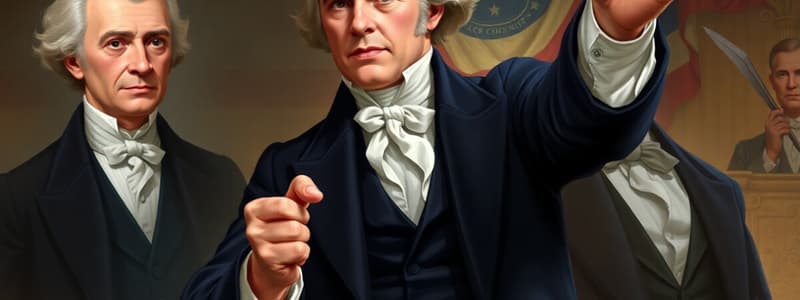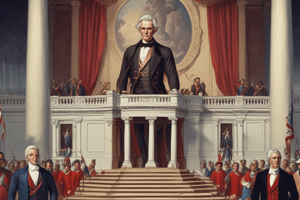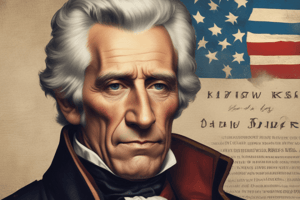Podcast
Questions and Answers
Who was the primary architect behind the Democrats during Jackson's presidency?
Who was the primary architect behind the Democrats during Jackson's presidency?
What did Martin Van Buren believe was necessary for the Democratic Party to maintain its principles?
What did Martin Van Buren believe was necessary for the Democratic Party to maintain its principles?
Which two notable figures were part of the Whig Party?
Which two notable figures were part of the Whig Party?
How did the Whig Party primarily unite its members?
How did the Whig Party primarily unite its members?
Signup and view all the answers
What was a crucial characteristic of the Whig Party's electoral success?
What was a crucial characteristic of the Whig Party's electoral success?
Signup and view all the answers
Study Notes
Jackson's Presidency and the Rise of the Democrats
- Jackson was a charismatic leader but Martin Van Buren was the strategist behind the Democrats.
- Van Buren succeeded Jackson as president.
- Van Buren's presidency was not remarkable.
- Van Buren emphasized the importance of an opposing party for a functioning democracy.
- He believed a governing party needs an opposition to address needs of different societal groups.
The Whig Party Emerges
- The Whigs opposed the Democrats from the 1830s to the 1850s.
- Prominent Whig members were Henry Clay and Daniel Webster.
- Whig presidential victories depended on military heroes like William Henry Harrison (1840) and Zachary Taylor (1848).
- The Whig Party had conflicting ideologies held together by opposition to the Democrats.
- Specific wings of the party comprised Northern industrialists and Southern planters.
Studying That Suits You
Use AI to generate personalized quizzes and flashcards to suit your learning preferences.
Description
Explore the key events and figures during Jackson's presidency and the formation of the Democratic Party. Learn about Martin Van Buren's strategic leadership and the emergence of the Whig Party in opposition. This quiz delves into the political dynamics of the early 19th century.




